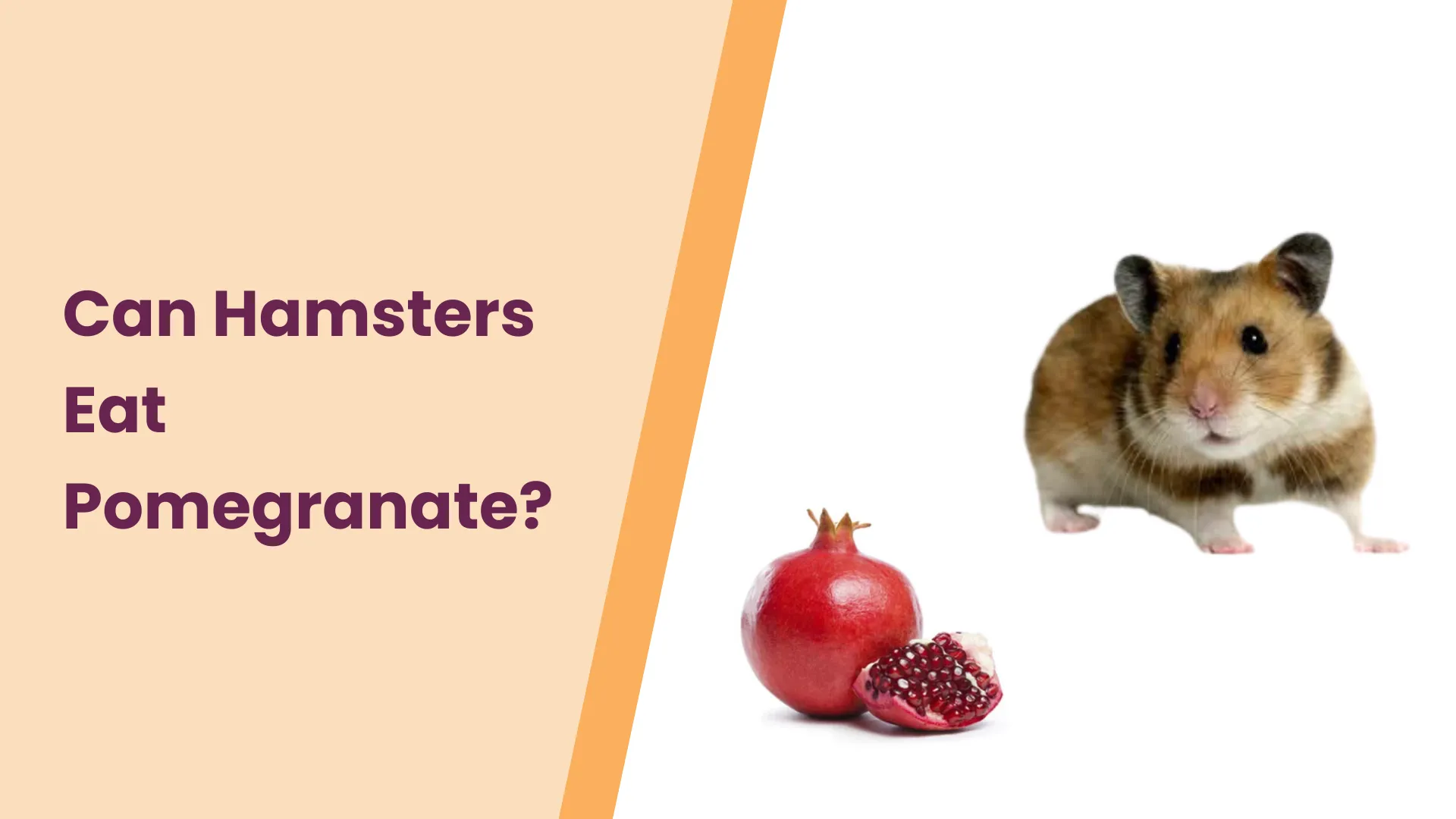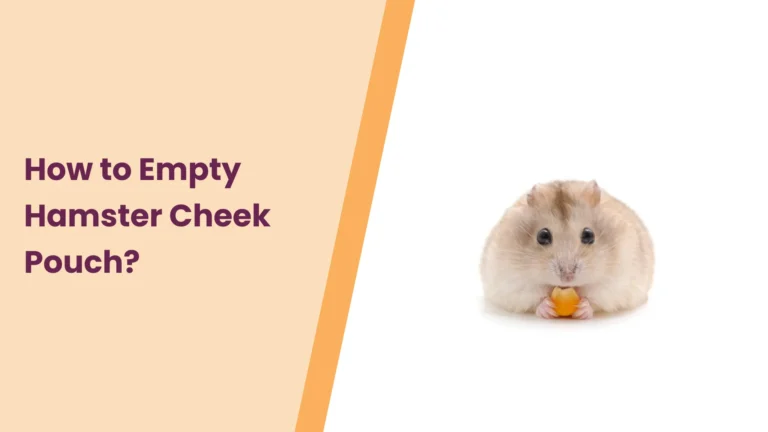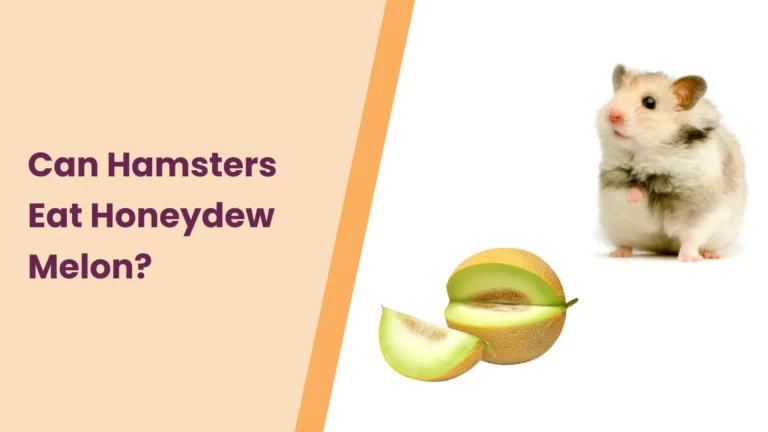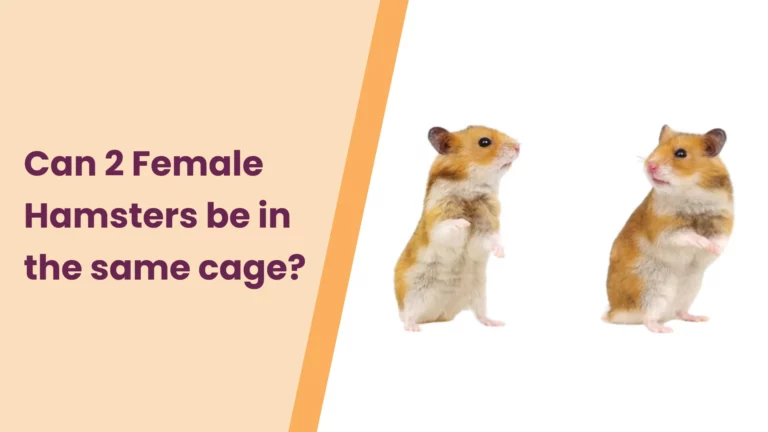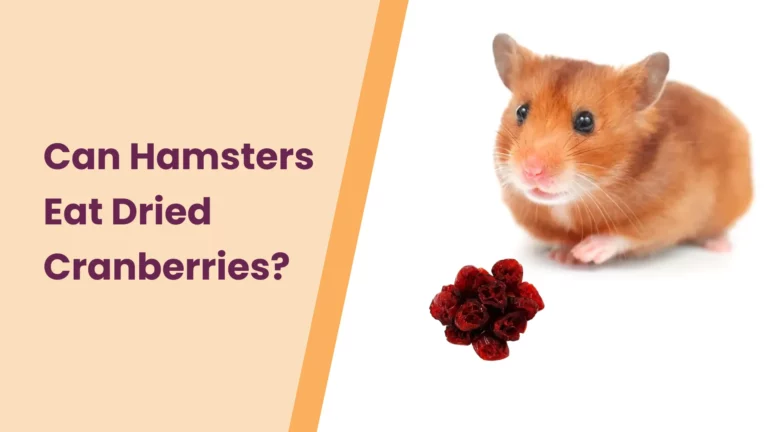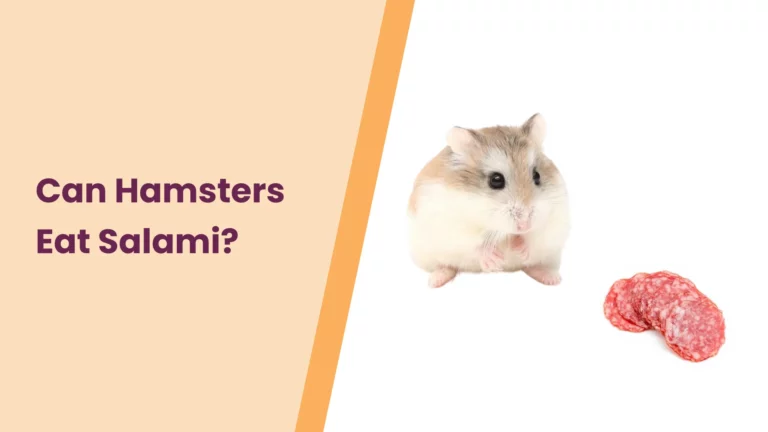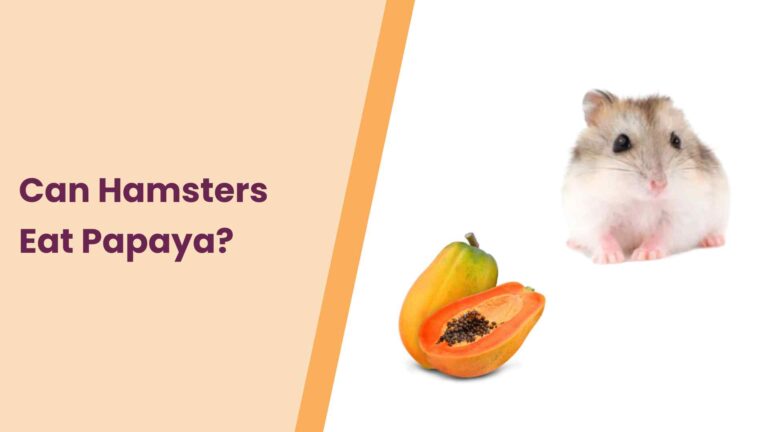Can Hamsters Eat Pomegranate? – All You Need To Know
As any hamster owner knows, these tiny, furry creatures bring immense joy to our lives. From their adorable antics on their exercise wheels to the soft rustle of their bedding, hamsters are cherished members of our families. Naturally, our love for them extends to the desire to treat them with delicious snacks every now and then.
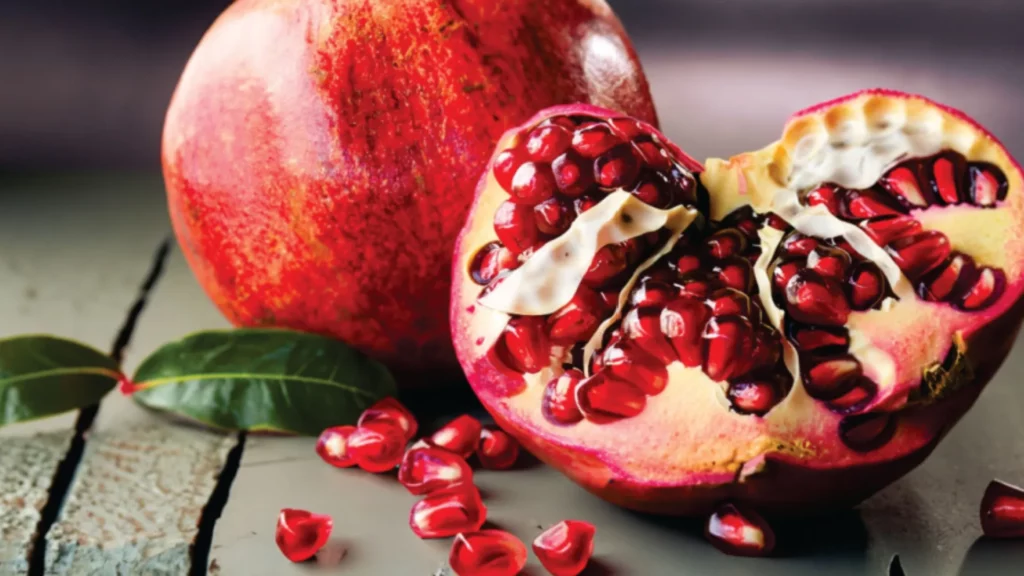
But what about pomegranate, the vibrant and exotic fruit that graces our tables with its sweet, jewel-like seeds? Are hamsters allowed to indulge in this crimson delight, or should we keep it strictly off their menu? In this comprehensive guide, we’re going to delve into the world of hamster nutrition and explore whether pomegranates can be a part of their diet.
So, if you’ve ever wondered if your fluffy friend can join the pomegranate party, read on to discover the delicious truth!
Understanding Hamster Diets
When you bring a fluffy hamster into your home, you become their provider, caregiver, and chef all rolled into one. Ensuring your pet’s well-being and health starts with understanding their dietary needs. Hamsters are tiny creatures with unique preferences and requirements when it comes to food.
Primary Diet of Pellets
The foundation of a hamster’s diet typically consists of high-quality hamster pellets. These pellets are specially formulated to provide the essential nutrients your furry friend needs to thrive. They offer a balanced mix of proteins, fiber, vitamins, and minerals.
When choosing pellets, look for those specifically designed for hamsters, as they are tailored to meet their nutritional requirements.
The Importance of Variety
While pellets form the core of a hamster’s diet, it’s crucial to offer variety to keep them happy and healthy. Just like us, hamsters appreciate a diverse menu. In the wild, they forage for a range of foods, so replicating this variety in captivity can contribute to their well-being.
Consider adding fresh vegetables, herbs, and occasional treats to their meals. Not only does this mimic their natural diet, but it also prevents boredom and promotes mental stimulation.
Role of Treats and Fruits in Moderation
Treats are a way to bond with your hamster and add a dash of excitement to their daily routine. However, moderation is the key to prevent health issues. Just like humans, hamsters can gain weight if they consume too many treats or fruits.
Some fruits, such as pomegranate, can be a delightful addition to their diet but should be offered sparingly. Overindulgence can lead to obesity, diabetes, and digestive problems.
Pomegranate Overview
Pomegranates, with their vibrant red hue and complex flavor profile, are as enchanting as they are nutritious. These ancient fruits have captured the imagination of cultures around the world for centuries, and their unique combination of taste and health benefits has made them a true superfood.
A Brief Introduction to Pomegranates: Pomegranates are not just fruits; they are treasures of nature. These round, red jewels with a tough outer skin protect a treasure trove of juicy, ruby-red seeds encased in a web of bitter white membranes. The seeds are where the magic happens, offering a burst of sweet and tart flavors that have delighted palates across the globe.
Nutritional Content: Pomegranates are nutritional powerhouses. They are packed with vitamins, particularly vitamin C, which boosts the immune system, and vitamin K, vital for healthy blood clotting. Additionally, they are rich in antioxidants, particularly punicalagins and anthocyanins, which can help combat free radicals in the body and reduce oxidative stress.
Potential Health Benefits for Humans: The nutritional benefits of pomegranates extend beyond their delightful taste. They have been associated with various health advantages for humans. Pomegranates may contribute to heart health by improving cholesterol levels and reducing blood pressure. They’re also known to have anti-inflammatory properties and could potentially aid in the prevention of certain chronic diseases.
While these attributes make pomegranates a compelling choice for human diets, the question remains: can they offer similar benefits to our beloved hamsters? In the following sections, we’ll explore the suitability of pomegranates as an occasional treat for your furry friend.
Can Hamsters Eat Pomegranate?
The question that’s been on many hamster owners’ minds is whether these delightful little creatures can safely enjoy the delectable taste of pomegranate. The answer, like many aspects of pet care, is nuanced.
Emphasizing Moderation and Caution: When it comes to introducing new foods into your hamster’s diet, moderation and caution are paramount. Pomegranates, although packed with nutritional goodness, can be a double-edged sword for your furry friend.
While the occasional nibble on a pomegranate seed can be a delightful treat, offering it in excess can lead to potential health issues.
Potential Benefits: Pomegranate seeds are rich in essential vitamins and antioxidants, which could, in theory, provide health benefits similar to those seen in humans. However, it’s important to remember that hamsters have very different dietary requirements than humans.
While there may be some nutritional advantages, the primary diet of hamsters should consist of pellets and fresh vegetables, with treats like pomegranate playing a minor role.
Potential Risks: Alongside the potential benefits, there are risks associated with feeding pomegranate to hamsters. The high sugar content in pomegranate can lead to obesity and diabetes in hamsters if consumed excessively.
Additionally, the seeds can be a choking hazard if not prepared and served correctly. These risks underscore the importance of offering pomegranate sparingly and in a hamster-safe manner.
So, the final verdict is, hamsters can eat pomegranate, but it should be a special treat rather than a regular part of their diet. As responsible pet owners, it’s our duty to ensure that any treats we provide are balanced and suitable for our pets’ unique dietary needs. So, if you decide to treat your hamster to a taste of pomegranate, do so in moderation and with a keen eye on their well-being.
Preparing Pomegranate for Hamsters
Before you treat your hamster to the exotic delight of pomegranate, it’s crucial to ensure the fruit is prepared in a way that maximizes safety and enjoyment.
Safe Preparation: To begin, wash the pomegranate thoroughly. This step is crucial to eliminate any potential pesticides or contaminants from the fruit’s surface. Remember that hamsters are highly sensitive creatures, and their tiny bodies are less equipped to handle toxins, making pesticide residues a particular concern.
Removing Seeds: The key to making pomegranate safe for your hamster is to carefully remove the seeds. These seeds are where the sweet, juicy goodness resides, but they also pose a choking hazard. Gently separate the seeds from the white membranes, ensuring that no hard, inedible parts are included. It’s worth the extra effort to make the treat more manageable and safe for your pet.
Serving Small, Manageable Portions: Hamsters are small animals, and even a small piece of pomegranate can be a substantial portion for them. Opt for the tiniest of servings, usually no more than a single seed or two to begin with. Monitor your hamster’s reaction and adjust the portion size based on their comfort and digestion.
You’ll ensure that the pomegranate you offer your hamster is not only delicious but also safe. The extra care taken in preparing the fruit can go a long way in ensuring your furry friend’s enjoyment and well-being.
How Much Pomegranate Can Hamsters Eat?
When it comes to serving pomegranate to your furry friend, it’s all about striking the right balance. Here are some guidelines to ensure your hamster enjoys this treat without any adverse effects.
Portion Control: Hamsters are small animals with even smaller stomachs. When offering pomegranate, think of tiny portions. A small piece of a pomegranate seed or two should suffice. This not only prevents overindulgence but also ensures your hamster gets to savor the treat without overwhelming their digestive system.
Observing Your Hamster: Each hamster is unique, and their tolerance for new foods can vary. When introducing pomegranate, keep a close eye on your pet. Observe their reaction to this new treat. If they show signs of discomfort, such as diarrhea or a change in behavior, it’s crucial to scale back or discontinue the treat. Remember, the aim is to enhance your hamster’s diet, not to disrupt it.
Frequency: While pomegranate can be an exciting addition to your hamster’s diet, it should remain an occasional indulgence rather than a daily treat. Once a week or even less frequently is a reasonable schedule. This approach ensures your hamster enjoys a diverse diet while staying healthy.
You can ensure that your hamster receives the benefits of pomegranate in a safe and controlled manner. It’s all about enriching their diet while keeping their well-being at the forefront.
Potential Risks and Allergies
While pomegranate can be a delightful addition to your hamster’s diet, it’s essential to be aware of potential risks and allergies, just as you would with any new food.
Digestive Issues: Hamsters, like all animals, have unique digestive systems. Introducing a new food can sometimes lead to digestive upsets. If you notice signs such as diarrhea, upset stomach, or changes in stool consistency after offering pomegranate, it’s advisable to discontinue the treat immediately. The goal is to enhance your hamster’s diet, not disrupt it.
Allergies: Although allergies are relatively rare in hamsters, they can occur. Allergies might manifest as skin rashes, itching, or respiratory distress. If you notice any unusual symptoms or behaviors in your pet after introducing pomegranate, consult a veterinarian for guidance.
Consulting a Veterinarian: If your hamster experiences severe or prolonged adverse reactions to pomegranate or any new food, it’s crucial to seek professional guidance. Veterinarians with experience in small animal care can offer insights into your pet’s specific condition and provide tailored advice to ensure their health and well-being.
While the risks associated with offering pomegranate to hamsters are relatively low, it’s essential to be vigilant and responsive to any adverse reactions. Your hamster’s health and happiness should always be the top priority, and consulting a veterinarian if you have any concerns is a responsible step in providing the best care for your furry friend.
Other Safe Fruits for Hamsters
If you’re looking to diversify your hamster’s diet beyond pomegranate, there are plenty of other fruits that can make for tasty and nutritious treats. Here are a few safe options for your furry friend:
1. Apples
Apples are a favorite among hamsters. They are a good source of fiber and vitamin C. Remove the seeds and offer small, thinly sliced pieces to prevent choking hazards.
2. Bananas
Bananas are rich in potassium and provide a sweet, creamy texture. Offer a small slice as an occasional treat.
3. Blueberries
These tiny powerhouses of antioxidants can be a great addition to your hamster’s diet. A few blueberries once in a while can provide a tasty and nutritious snack.
4. Strawberries
Strawberries are a delightful source of vitamin C and fiber. Offer a small, washed, and sliced piece for your hamster to enjoy.
5. Grapes
Grapes are a hydrating option and offer vitamin K and various antioxidants. Remember to cut them into small, manageable pieces.
6. Cranberries
These tangy gems are packed with vitamin C and antioxidants. Offer a small portion of cranberries, preferably dried or unsweetened.
7. Papaya
Papaya is a tropical treat that provides vitamin A, vitamin C, and fiber. Offer a small, ripe piece without seeds.
8. Kiwi
Kiwi is another vitamin C powerhouse with a unique flavor. Remove the skin and seeds and offer small, diced pieces.
Each of these fruits can be a delightful and nutritious addition to your hamster’s diet when offered in moderation. However, always remember to wash them thoroughly, remove any seeds, and serve them in small, manageable portions to ensure your pet’s safety and enjoyment.
Conclusion
In the journey of hamster care, the question of whether these small pets can enjoy pomegranate has been answered. Yes, with proper precautions, pomegranate can be a delightful and nutritious treat for your furry companion. However, the keyword here is moderation.
Your hamster’s well-being is of paramount importance. Balancing their diet with a variety of high-quality pellets, fresh vegetables, and occasional treats like pomegranate ensures a happy and healthy life. Remember, their small size and unique digestive systems mean that even a tiny treat can have a significant impact.
So, when offering pomegranate or any new food, keep a watchful eye on your hamster’s reaction, and take cues from them. If you ever have concerns or encounter adverse reactions, consult a veterinarian experienced in small animal care for guidance.
By approaching their diet with love, care, and responsible choices, you can ensure that your beloved hamster enjoys a well-rounded and satisfying life in your loving care. Here’s to many more delightful moments and joyful treats in the company of your furry friend!
“Your thoughts and experiences are invaluable, and we’d be delighted to hear about them. Have you tried offering pomegranate or other fruits to your hamster? How did they react? Feel free to share your insights, stories, or questions in the comments below. Your input not only enriches our content but also provides a supportive community for fellow hamster enthusiasts.
If you found this information helpful, why not share it with others who might benefit from it? Whether it’s on social media, in your favorite pet forums, or among your hamster-loving friends, spreading the word can help fellow pet owners make informed choices for their furry friends.
We appreciate your engagement, and together, we can create a valuable resource for hamster lovers everywhere.” – Hamsterpit.

